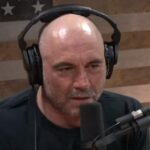



Is the American media so obsessed with late-night TV drama that it’s ignoring a full-scale assault on free speech across the pond? Podcaster Joe Rogan thinks so, and he’s not holding back in calling out the misplaced priorities of mainstream outlets.
Rogan has aimed at the media for fixating on Jimmy Kimmel’s controversial remarks while turning a blind eye to what he calls a dangerous erosion of civil liberties in the United Kingdom and Europe.
Let’s start with the domestic dust-up: Jimmy Kimmel, the late-night host, stirred controversy with comments about an alleged assassin tied to conservative activist Charlie Kirk. His remarks were so polarizing that his show faced a brief suspension, igniting debates over censorship right here at home. But Rogan argues this is small potatoes compared to what’s brewing overseas.
Rogan’s frustration is palpable when he points out that American outrage seems laser-focused on talk-show monologues rather than the loss of fundamental rights in the English-speaking world. “No one in America is freaking out about what's happening in the UK at all,” he said. And frankly, when you look at the numbers, it’s hard to disagree with his assessment.
Across the Atlantic, the British government is reportedly arresting around 12,000 people annually for their social media posts. These aren’t calls to violence, Rogan insists, but often just opinions or even likes on posts that land folks in hot water. It’s a statistic that should make any freedom-loving person pause.
The U.K. has also proposed a digital ID mandate, a policy critics warn could become a tool for government overreach. Rogan likened these restrictions to a wrestling “choke hold” on citizens, suggesting that basic freedoms are slipping away under the guise of control. It’s a vivid image—and a troubling one.
Free speech in the U.K. isn’t just a policy debate; it’s a cultural fault line. Issues like mass migration and gender ideology have sharply divided the public in recent years, with tensions boiling over into the streets.
Take the “Unite the Kingdom” rally in London on Sept. 13, 2025, where tens of thousands gathered near Parliament, waving Union Jack and St. George’s flags. The event underscored just how raw the free speech debate has become, as protesters pushed back against what they see as stifling government policies.
British Prime Minister Keir Starmer hasn’t escaped scrutiny either, with numerous public figures criticizing his leftist policies as contributing to this climate of restriction. It’s a political tightrope, and many feel the government is leaning too far toward control over liberty.
Rogan’s warnings carry a dystopian edge, and he’s not mincing words about the stakes. “This is an Orwell nightmare coming to life right in front of our faces, and no one's flinching,” he declared. It’s a chilling thought—arrests for liking a post, investigations for merely viewing content, all while digital IDs loom on the horizon.
Yet, as Rogan points out, the American media seems content to fuss over whether a comedian crossed a line rather than spotlight this creeping authoritarianism. It’s as if we’re debating the color of the curtains while the house is on fire. Where’s the sense of urgency?
The contrast couldn’t be starker: a talk-show host’s suspension grabs headlines, while 12,000 arrests for online speech barely get a whisper. If Rogan’s right, we’re not just distracted—we’re complicit in ignoring a fundamental threat to Western values.
Let’s be clear: critiquing a late-night host’s monologue isn’t unimportant, especially when it touches on censorship. But when weighed against a government rounding up citizens for their online opinions, it’s hard to argue that the scales balance. Rogan’s call to shift focus feels like a much-needed wake-up call.
The U.K.’s trajectory should concern anyone who values the right to speak freely, whether you’re on the left, right, or somewhere in between. If a digital ID system and mass arrests for posts are the future, what’s stopping that from crossing the Atlantic? It’s a question worth pondering before we’re too deep in our own chokehold.



